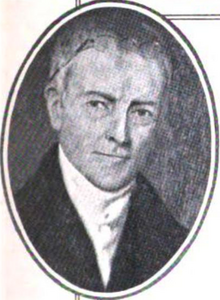
Orange County is a county located in the Piedmont region of the U.S. state of North Carolina. As of the 2020 census, the population was 148,696. Its county seat is Hillsborough.

Caswell County is a county in the U.S. state of North Carolina. It is located in the Piedmont Triad region of the state. At the 2020 census, the population was 22,736. Its county seat is Yanceyville.

The town of Hillsborough is the county seat of Orange County, North Carolina, United States and is located along the Eno River. The population was 6,087 in 2010, but it grew rapidly to 9,660 by 2020.
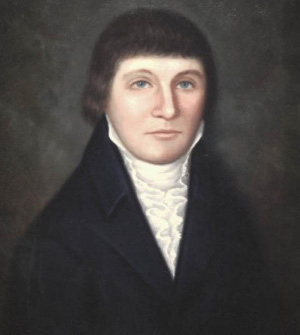
Richard Caswell was an American politician and lawyer who served as the first and fifth governor of the U.S. state of North Carolina from 1776 to 1780 and from 1785 to 1787. He also served as a senior officer of militia in the Southern theater of the American Revolutionary War. As a delegate to the First Continental Congress, he was a signatory of the 1774 Continental Association.

John Motley Morehead was an American lawyer and politician who became the 29th governor of the U.S. state of North Carolina. He became known as "the Father of Modern North Carolina."

Tod Robinson Caldwell was an American lawyer and the 41st governor of the U.S. state of North Carolina from 1871 until his death in Hillsborough in North Carolina in 1874. He was a son of John Caldwell (1779–1857) and Hannah Pickett Robinson (1794–1875).

Henry Atkinson was a United States army officer serving on the western frontier during the War of 1812 and the Yellowstone expedition. With Benjamin O'Fallon, he negotiated treaties with Indigenous nations of the upper Missouri River in 1825. Over his career in the army, he served in the West, the Gulf Coast, and in New York at the border with The Canadas.

William Henry Bailey was an American author, lawyer, and politician. He was the North Carolina Attorney General and served in the North Carolina General Assembly. He co-founded and taught law at the Bailey Law School.

Peter Umstead Murphey was a former officer of the United States Navy who joined the Confederate States Navy during the American Civil War. He was the son of Archibald DeBow Murphey and Jane Armistead Murphey.

Bartlett Yancey was an American politician who was a U.S. congressman from North Carolina, United States, between 1813 and 1817. He was a member of the Democratic-Republican party.
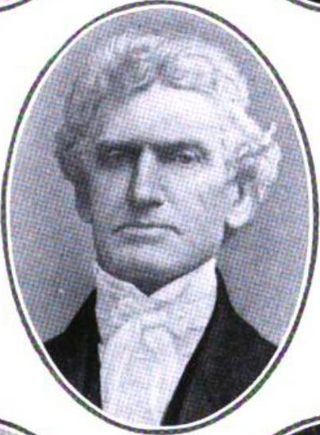
Thomas Ruffin (1787–1870) was an American jurist and justice of the North Carolina Supreme Court from 1829 to 1852 and again from 1858 to 1859. He was chief justice of that Court from 1833 to 1852.
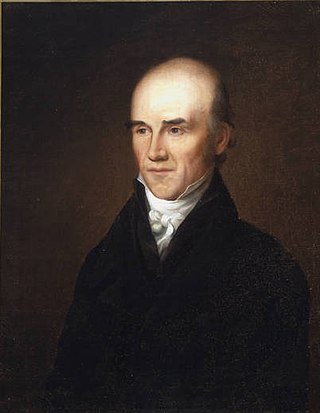
Joseph Caldwell was a U.S. educator, Presbyterian minister, mathematician, and astronomer. He was the first president of the University of North Carolina at Chapel Hill, holding the office from 1804 until 1812, and from 1816 until his death in 1835.
The Hillsborough District Brigade of militia was an administrative division of the North Carolina militia established on May 4, 1776. Brigadier General Thomas Person was the first commander. Companies from the eight regiments of the brigade were engaged in 55 known battles and skirmishes in North Carolina, South Carolina, and Georgia during the American Revolutionary War. It was active until the end of the war.
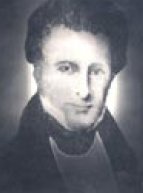
Edmund Charles Fox Strudwick at Long Meadows, north of Hillsborough, in Orange County, North Carolina. He eventually designed the first building at Dorothea Dix mental hospital in 1848, where he also was chosen as the first "Physician and Superintendent," a temporary position he held until 1853. He was also instrumental in the founding of the medical school at the University of North Carolina, and was elected the North Carolina Medical Society's first president April 17, 1849.
The Kirk–Holden war was a police operation taken against the white supremacist organization Ku Klux Klan by the government in the state of North Carolina in the United States in 1870. The Klan was using murder and intimidation to prevent recently freed slaves and members of the Republican Party from exercising their right to vote in the aftermath of the American Civil War. Following an increase in Klan activity in North Carolina—including the murder of a black town commissioner in Alamance County and the murder of a Republican state senator in Caswell County—Republican Governor of North Carolina William W. Holden declared both areas to be in a state of insurrection. In accordance with the Shoffner Act, Holden ordered a militia be raised to restore order in the counties and arrest Klansmen suspected of violence. This resulted in the creation of the 1st and 2nd North Carolina Troops, which Holden placed under the overall command of Colonel George Washington Kirk.
Caldwell Academy is a private, co-educational, college preparatory Classical Christian school located in Greensboro, North Carolina, United States. Caldwell provides a TK–12 education from a Classical Christian perspective.
The Salisbury District of North Carolina, was originally one of six colonial judicial districts established in 1766 by the Governor William Tryon of the Province of North Carolina. Immediately preceding the onset of the American War of Independence in 1775, these six regions were renamed "military districts" by the North Carolina Provincial Congress and used for organizing the North Carolina militia. The other military districts were Edenton, Halifax, Hillsborough, New Bern, and Wilmington districts. The military district designation was discontinued in 1835 during the North Carolina Constitution Convention.

Caswell County Schools is a PK–12 graded school district serving Caswell County, North Carolina. Its six schools serve 3,012 students as of the 2010–2011 school year.

David Caldwell Log College Site is a historic archaeological site located at Greensboro, Guilford County, North Carolina. It was the site of the 1767 home, school, and farm operated by David Caldwell and his family through about 1825. The site underwent archaeological excavations in 1959-1960 and 1979. It was the site of Dr. Caldwell's Academy, perhaps the most influential Southern academy of the era. Among those educated at the academy was Archibald Murphey. The land was also used as a staging area for the Battle of Guilford Courthouse in 1781.
Samuel Eusebius McCorkle was a pioneer Presbyterian preacher, teacher, advocate for public and private education in North Carolina, and the interceptor and progenitor of the University of North Carolina at Chapel Hill, who first promoted the idea of establishing a university in the state.
